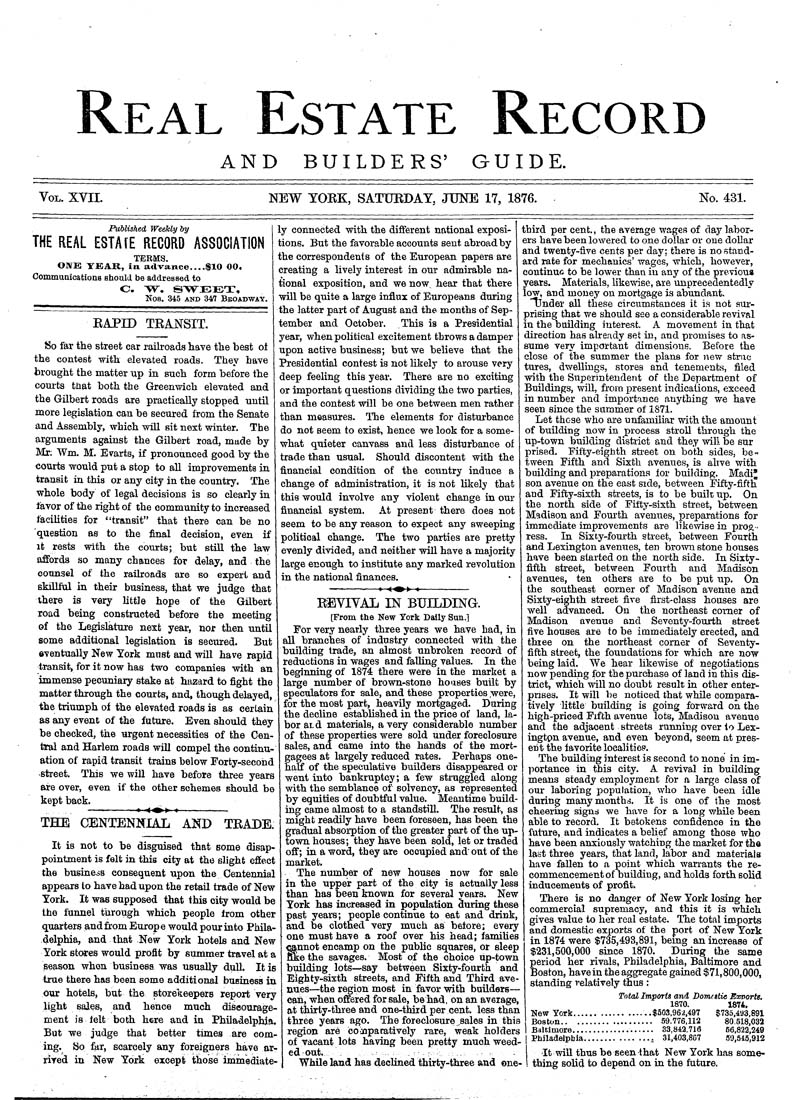Columbia University Libraries Digital Collections: The Real Estate Record
Use your browser's Print function to print these pages.
Real estate record and builders' guide: v. 17, no. 431: June 17, 1876

Text version:
Please note: this text may be incomplete. For more information about this OCR, view About OCR text.
Real Estate Record AND BUILDERS' GUIDE. Vol. XVII. !NEW TORK, SATURDAY, JUKE 17, 1876. !No. 431. Published Weekly by THE REAL ESTAfE RECORD ASSOCIATION TERMS. OKE TEAR, in adirance___§10 00. Communications ahould be addressed to Nos. 345 AND 347 Bboadway. RAPID TRANSIT. So far the street car railroads have the best ot the contest with elevated roada. They have brought the matter up in such form before the courts that both the Greenwich elevated and the Gilbert roads are practically stopped until more legislation can be secured from the Senate and Assembly, which will sit nest winter. The arguments against the Gilbert road, made by Mr; Wm. M. Evarts, if pronounced good by the courts would put a stop to all improvements in transit in this or any city in the country. The whole body of legal decisions is so clearly in favor of the right of the community to increased facilities for "transit" that there can be no question as to the final decision, even if it rests with the courts; but still the law affords so many chances for delay, and the counsel of the railroads are so expert and skillfal in their business, that we judge that there is very little hope of the Gilbert road being constructed before the meeting of the Legislature next year, nor then until some additional legislation is secured. But ©venttially New York must and will have rapid transit, for it now has two companies with an immense pecuniary stake at hazard to fight the matter through the courts, and, though delayed, the triumph of the elevated roads is as certain as any event of the future. Even should they be checked, the urgent necessities of the Cen¬ tral and Harlem roads will compel the continu¬ ation of rapid transit trains below Forty-second •street. This we will have before three years aire over, even if the other schemes should be kept back. -----------«<>«----------- THE CENTENNIAL AND TRADE. ly connected with the different national exposi¬ tions. But the favorable accounts sent abroad by the correspondenls of the European papers are creating a lively interest in our admirable na¬ tional exposition, and we now, hear that there will be quite a large influx of Europeans during the latter part of August and the months of Sep¬ tember and October. This is a Presidential year, when political excitement throws a damper upon active business; but we believe that the Presidential contest is not likely to arouse very deep feeling this year. There are no exciting or important questions dividing the two parties, and the contest will be one between men rather than measures. The elements for disturbance do not seem to exist, hence we look for a some¬ what quieter canvass and less disturbance of trade than usual. Should discontent with the financial condition of the country induce a change of administration, it is not likely that this would involve any violent change in our financial system. At present there does not seem to be any reason to expect any sweeping political change. The two parties are pretty evenly divided, and neither will have a majority large enough to institute any marked revolution in the national finances. It is not to be disguised that some disap¬ pointment is felt in this city at the slight effect the business consequent upon the Centenidal appears to have had upon the retail trade of New York. It was supposed that this city would be the funnel through which people from other quarters and from Europe would pour into Phila¬ delphia, and that New York hotels and New York stores would profit by summer travel at a season when business was usually duU. It is true there has been some additional business in our hotels, but the storekeepers report very light sales, and hence much discourage¬ ment is telt both here and in Philadelphia. But we judge that better times are com¬ ing. So far, scarcely any foreigners have ar¬ rived in New York except those iminediate- EEVIVAL IN BUILDING. [From the New York Daily Sun.] For very nearly three years we have had, in all branches of industry connected with the building trade, an almost unbroken record of reductions in wages and falling values. In the beginning of 1874 there were in the market a large number of brown-stone houses built by speculators for sale, and these properties were, for the most part, heavily mortgaged. Daring the decline established in the price of land, la¬ bor aLd materials, avery considerable number of these properties were sold under foreclosure sales, and came into the hands of the mort¬ gagees at largely reduced rates. Perhaps one- half of the speculative builders disappeared or went into bankruptcy; a few struggled along with the semblance of solvency, as represented by equities of doubtful value. Meantime buUd¬ ing came almost to a standstill. The result, as might readily have been foreseen, has been the gradual absorption of the greater part of the up¬ town houses; they have been sold, let or traded off; in a word, they are occupied and' out of the market. The number of new houses now for sale in the upper part of the city is actually less than has been known for several years. New York has increased in population during these past years; people continue to eat and drink, and be clothed very much as belore; every one must have a roof over his head; famihes